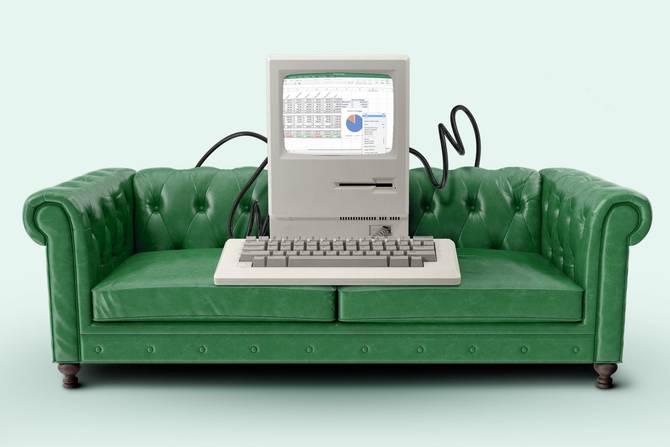Hiya. The New York Times released a tool where you can estimate your rate of inflation. If you’re like our editor and are a vegetarian, non-driving, coastal city-dweller, maybe your lower personal inflation rate will give you an extra frisson of superiority to power your Wednesday. If you’re a travel junkie who prefers to scarf down BBQ in your newly purchased used car…uhhh, well, we’re weeping with you.
In today’s edition:
 Money makin’ Money makin’
🫠 Burn on
 Coworking Coworking
—Susanna Vogel, Sam Blum, Kristen Parisi
|
|
Breaking Bad/AMC via Giphy
What’s the going rate for the personnel recordkeeper, benefits wiz, self-trained Excel guru, emotional-support person, leadership liaison, and office morale hype-person, otherwise known as an HR generalist? And whatever that number is, is it really enough?
We aren’t the only ones asking. Alison Green, a work advice columnist who has run the popular blog Ask A Manager for the past 15 years, told HR Brew she’s noticed a slight uptick in reader questions about pay in the past year.
Green said that she thinks workers sense they have more power and options than before and, as a result, are being more “forthright about their willingness to chase the money.”
“They’re being more up-front that they will leave for more money or that they need more money to stay in a way that people used to feel more uncomfortable with,” Green said.
Which numbers? To chase the money, it’s helpful for HR professionals to know what the going rate for their job title is, roughly speaking—a question that Green said can be difficult to answer.
-
Estimates can vary. As of May 2021, the Bureau of Labor Statistics estimated HR managers made an annual mean wage of $136,590; Salary.com estimated median compensation at $110,353, and Payscale shared unpublished data with HR Brew showing median salaries for the same role at $135,000 as of Q1 2022.
-
Certifiable. Payscale analyzed HR salaries between May 2021 and May 2022 using company-sourced data from over 1,300 companies and found that some employers are paying extra for guac advanced certifications. For example, among HR professionals, those who were certified employee benefits specialists (CEBS) or certified internet recruiters (CIR) were paid an average of 20% and 16% more, respectively, than employees who didn’t have the certification, according to Payscale.
-
Sweet skills. Similarly, Payscale found that HR professionals in the US who had skills in 401(k) plan administration, program development, or negotiation made at least 17% more than their colleagues without similar experience.
Without taking into account these factors, Green said employees looking for salary transparency could be inadvertently comparing apples to differently compensated oranges. Keep reading here.—SV
Do you work in HR or have information about your HR department we should know? Email [email protected] or DM @SusannaVogel1 on Twitter. For completely confidential conversations, ask Susanna for her number on Signal.
|
|
Succession/HBO via Giphy
Burnout refuses to uh, burn out. In April, Google searches for “burnout” reached an all-time high, Quartz reported. It’s the third year of the pandemic, and the phenomenon—defined by the World Health Organization as “a syndrome conceptualized as resulting from chronic workplace stress that has not been successfully managed”—has been difficult to eliminate, much like the virus that some say has exacerbated burnout.
Employers say addressing burnout remains a priority, and many organizations have enacted plans to help counter burnout among their workers. Some are even experimenting with real-time burnout dashboards in an attempt to mitigate turnover. Nevertheless, as Google Trends data suggests, burnout persists. But why?
Charlie Judy, chief people and culture officer at the health-care data company Intelligent Medical Objects, believes there’s no single approach to addressing burnout that works for organizations across the board.
“We understand that there’s more [burnout] in the workplace now, but we don’t understand what that really means,” he told HR Brew in a recent phone call.
One size doesn’t fit all. Burnout is opaque, Judy argued, meaning that it presents differently across employees. “It can mean that I’ve lost focus, I’ve lost interest, that I’m physically exhausted. It could mean that I’m reaching the point of…anxiety overload. It could mean all of those things,” he said.
This is also true for the causes of burnout, he explained. For example, some people might experience burnout because the lines between work and life have become blurred while working remotely. Working in an office with other people, he argued, “is a social, mental [and] physical alleviation of stress, anxiety…we are social human beings. And unfortunately, much of that comes from our interaction at work.”
But others might feel that going to an office is what burns them out. “There are people that have just as much burnout because they have to get on the road every day, catch a train…and by the time they get home, dinner’s done, their kids are ready for bed.”
So how does an organization prevent burnout across the board? Keep reading here.—SB
Do you work in HR or have information about your HR department we should know? Email [email protected] or DM @SammBlum on Twitter. For completely confidential conversations, ask Sam for his number on Signal.
|
|
|
Growth is A+ news for any company. But too many workplaces lack the IT tools to support all that (excellent!) growth. That means your HR team gets bogged down in managing onboarding and access … instead of people.
Electric hears ya. They’ll take the low-level HR and logistical IT tasks off your hands, letting you focus on what you do best.
Electric’s development, compliance, and standardization tools streamline your processes, and their chat-based support simply can’t be beat. Speaking of beats, if your company has 10–500 employees and you set up a qualified meeting with Electric, they’ll give you a FREE pair of Beats Solo3 Wireless headphones.
Let’s review: stellar IT support, growth your HR team can feel great about, and sweet, sweet headphones. Get started here.
|
|
On Wednesdays, we schedule our weekly 1:1 with HR Brew’s readers. Want to be featured in an upcoming edition? Click here to introduce yourself.
Zeb Daniel is a senior people operations generalist at the parking payment app ParkMobile, which was acquired by the Stockholm-based EasyPark Group in 2021. ParkMobile, which currently has around 170 employees and is headquartered in Atlanta, Georgia, now competes for tech talent with giants like Microsoft and Google, but in our recent interview, Daniel told us why he thinks ParkMobile punches above its weight when it comes to recruiting and retention.
How would you describe your specific job to someone who doesn’t work in HR? I lead internal programs that give people the opportunity to get more out of work than just a paycheck. I help people learn and grow and discover new things they’re good at by seeking to understand what motivates them as a person and what untapped skills they possess.
What’s the best change you’ve made at a place you’ve worked? I’ve been instrumental in the recent acquisition of our company—especially following the departure of the entire HR staff. I’ve been leading change management as we’ve integrated more closely with our parent company out of Europe.
You had the entire HR staff leave at one point…What’s that been like? So, shortly after I started working for ParkMobile, we were acquired by a company based out of Sweden. And at that point, my manager had contributed and built up our HR team to the point that she wanted to go and kind of do the same thing at another company…There was a lot going on at that time, especially in the Atlanta tech market. There was high turnover for us because Atlanta had seen an influx of tech companies coming here. Microsoft opened an office in Atlanta down the street from us. Google is two blocks away now…So for us, [we’ve] seen a higher level of competition in the marketplace, which led to some turnover from our staff, but also gave us the opportunity to seek out some new tech talent.
How are you competing with bigger tech firms that are coming in? Keep reading here.—KP
Want to be featured in an upcoming edition of Coworking? Click here to introduce yourself.
|
|
|
Let’s open up the floor. A healthy, happy workplace thrives on open communication—but getting people to open up can be tricky. Let AllVoices help. The Employee Intelligence Platform lets employees share their feelings openly, anonymously, and from anywhere. Turn feedback into your #1 retention tool and sign up today.
|
|
Today’s top HR reads.
Stat: Massachusetts is the best state in the US for working moms, while Louisiana ranked last, according to a recent WalletHub analysis of data on professional opportunities, childcare, and work-life balance. (WalletHub)
Quote: “We need to create a system that measures and scrutinizes actual positive impact on our planet, so unsuspecting individual investors can choose to support companies that can make and prioritize positive change,” Tesla wrote in a report that called environmental, social, and governance measurements “fundamentally flawed.” (Bloomberg)
Read: Some former employees allege that TikTok’s work culture was so “intense” that they experienced weight fluctuations; bled through pants rather than step away from a meeting to get a tampon; and sought therapy. (The Wall Street Journal)
Good companies give rewards. Great companies don’t stop there. Motivosity checks all the boxes when it comes to rewarding your team members. But employee engagement goes further with cultures of gratitude, and Motivosity makes that your superpower. Get started.*
*This is sponsored advertising content.
|
|
What do making milkshakes and drafting HR policies have in common? Both require careful blending and can bring great joy.
On May 17 at 12pm ET, HR Brew has the pleasure of sitting down with Shake Shack (a milkshake connoisseur) to talk about the balance between employee well-being and productivity. The event, sponsored by CareerBuilder, will highlight actions and initiatives as well as the importance of being an empathetic leader.
Sign up here.
|
|
-
The EEOC sued tutoring provider iTutorGroup for age discrimination, alleging that its recruitment software was programmed to automatically reject older applicants “because of their age.”
-
Uber announced in an email to employees that it plans to cut costs and “treat hiring as a privilege and be deliberate about when and where we add headcount” in response to a “seismic shift in investor sentiment.”
-
On Friday, the NLRB filed a complaint against Starbucks for allegedly retaliating against union organizers in western New York; on the same day, a Starbucks employee in Wisconsin claimed he was fired because of his organizing efforts.
-
More than 800,000—that’s how many people Airbnb said have checked out the company’s careers page since the home-share giant announced its expansive remote-work policy in late April.
|
|
Catch up on the top HR Brew stories from the recent past:
|
|
|









